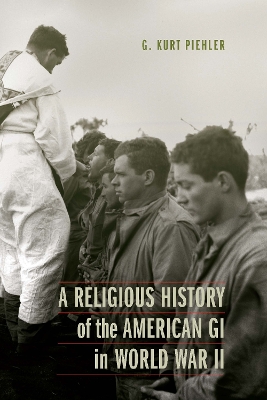Studies in War, Society, and the Military
1 total work
A Religious History of the American GI in World War II breaks new ground by recounting the armed forces' unprecedented efforts to meet the spiritual needs of the fifteen million men and women who served in World War II. For President Franklin D. Roosevelt and many GIs, religion remained a core American value that fortified their resolve in the fight against Axis tyranny. While combatants turned to fellow comrades for support, even more were sustained by prayer. GIs flocked to services, and when they mourned comrades lost in battle, chaplains offered solace and underscored the righteousness of their cause. This study is essential reading for anyone seeking to understand the social history of the American GI during World War II.
Drawing on an extensive range of letters, diaries, oral histories, and memoirs, G. Kurt Piehler challenges the conventional wisdom that portrays the American GI as a nonideological warrior. American GIs echoed the views of FDR, who saw a Nazi victory as a threat to religious freedom and recognized the antisemitic character of the regime. Official policies promoted a civil religion that stressed equality between Protestantism, Roman Catholicism, and Judaism. Many chaplains embraced this tri-faith vision and strived to meet the spiritual needs of all servicepeople regardless of their own denomination. While examples of bigotry, sectarianism, and intolerance remained, the armed forces fostered the free exercise of religion that promoted a respect for the plurality of American religious life among GIs.
Drawing on an extensive range of letters, diaries, oral histories, and memoirs, G. Kurt Piehler challenges the conventional wisdom that portrays the American GI as a nonideological warrior. American GIs echoed the views of FDR, who saw a Nazi victory as a threat to religious freedom and recognized the antisemitic character of the regime. Official policies promoted a civil religion that stressed equality between Protestantism, Roman Catholicism, and Judaism. Many chaplains embraced this tri-faith vision and strived to meet the spiritual needs of all servicepeople regardless of their own denomination. While examples of bigotry, sectarianism, and intolerance remained, the armed forces fostered the free exercise of religion that promoted a respect for the plurality of American religious life among GIs.
